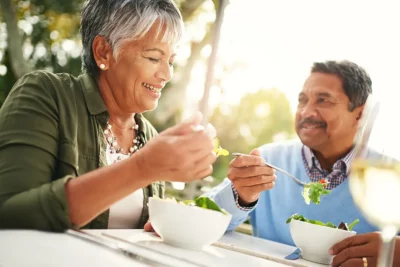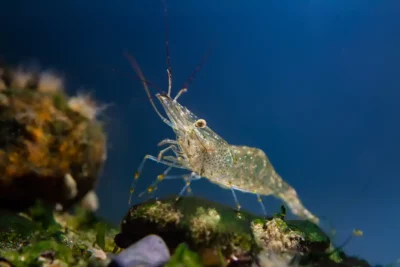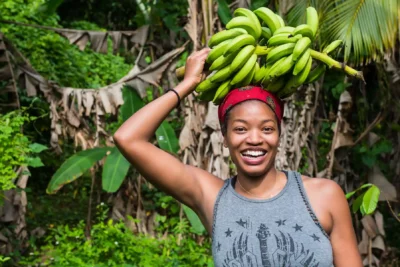When a vegan and non-vegan embark on a relationship — or when someone within a relationship embarks on veganism — there can be a whole raft of challenges to overcome. Here, we examine some of the emotional and ethical trigger points, as well as the practicalities of creating a happy vegan-omni relationship.
Can Vegans and Non-Vegans Be Happy in a Relationship?
Yes, they can! But being in such a relationship can raise some issues, and how easy they are to overcome depends on the individuals, their views, and how willing or able they may be to compromise. Many vegans would not feel comfortable sitting down to dinner with someone who has an animal on their plate, for example. And not every meat-eater would be willing to eat plant-based foods every day. But many couples do make this work and come to an agreement about what is best for them. It may be that the household is plant-based but the non-vegan partner can eat whatever they wish when outside of the home. It may be that the vegan isn’t too uncomfortable about milk from cows being stored in the fridge but draws the line at meat. Whatever the solution, open and honest communication can help both partners feel understood, respected, and supported.
Vegan Meets Non-Vegan
The differences in requirements and expectations are easier to navigate if both parties first meet as a vegan and non-vegan. From the beginning, both will know where the other stands, and will already accept their differences… otherwise, they would never have got together at all! It can be an interesting journey, as the omnivore learns more about the reasons why someone would eat plant-based, and the vegan learns more about what makes others so committed to different food choices. As the relationship progresses, there will be discussions about catering for guests, where to eat out, and what each feels comfortable with. For many, these kinds of questions can be navigated quite easily, but for others there may be clashes. If both parties have strong views and entrenched positions, and those issues cannot be resolved, this is probably not the right relationship for you.
When Your Partner Goes Vegan
Things can be a little trickier if one person within the relationship who has always eaten meat, dairy, and eggs, decides to become vegan. For some couples, that can bring up a lot of emotional issues, and create different challenges, even tensions. But it does depend on what led that person to the decision to become vegan, and whether they have been sharing their thoughts and feelings with their partner throughout the process..
People who start eating a plant-based vegan diet for their health are unlikely to have the same strong feelings about their partner’s dietary choices as someone who becomes vegan for ethical reasons. For those who have come to see and understand the depth of suffering caused to animals who are farmed, it can be highly distressing to be in a relationship with someone who has not made that same connection, or perhaps doesn’t care about animals at all.
Those who love and cherish the compassion inherent in their newly vegan partner may be more understanding and more willing to make compromises in their own food choices out of respect. And some will open their hearts and minds to this new way of eating and join their partner on this deeply impactful journey.
Vegan Trying to Change a Non-Vegan Partner
Whether you come to the relationship as a vegan or you become vegan while already in it, it can be upsetting if your partner is unwilling to make any concessions to your own beliefs. Non-vegans may not understand the depth of feeling that vegans have, and that many of us see animals as having the same rights to live free from deliberate harm as people. To see someone you love eating the body of an animal can therefore be distressing and can create a lot of tension within the relationship.
The vegan may ask themselves: how can I love someone who hurts animals? While the meat-eater may consider themselves an animal-lover who would never dream of hurting an animal … at least directly. It is not always easy for vegans to remember that most of us were non-vegans once and that we all come to veganism in our own time and for our own reasons.
So, should we try and change our non-vegan partners? That is a tricky question. It is certainly appropriate to inspire, to showcase delicious foods, and to introduce your non-vegan partner to farmed animals in sanctuaries and perhaps to farmed animal investigations and campaigns in order to better educate them and inform their own choices. But whether they become vegan or not, that is ultimately their choice to make. And if we set out to change them, we may be setting ourselves up for heartbreak.
Persuading a Non-Vegan To Be Vegan
For vegans in a relationship with a non-vegan, it can be tempting to become a little evangelical and to put some significant emotional pressure on their partner. We get it! When you first understand the great harms that animal agriculture causes to the planet and to animals, and you discover a way of eating that is delicious and healthy, and reduces our negative impact on the world, of course we want to shout it from the rooftops! But this is often taken as lecturing or hectoring, and can sometimes feel just a little judgmental, and so it is better to tone down our advocacy and be more mindful of others’ feelings and views. We recommend:
- Gently introducing your partner to some of the issues and giving them space to think about them.
- Not raising ethical or environmental issues at mealtimes.
- Cooking / providing delicious plant-based meals and desserts to tackle the often-unspoken assumption that vegan food is boring.
- Visiting a farmed animal sanctuary together. Meeting animals who have been rescued from the industry can be a transformative experience.
- Listening to your partner’s worries about — or objections to — becoming vegan. Some of them will be easy to tackle, but others may take time to address.
- Never underestimating the power of habit. For some people, changing what they eat is just unthinkable.
- Cutting them some slack. If your omni partner is experiencing pressures elsewhere — such as at work, with their families, or with their mental health, for example — this may not be the right time to broach these issues.
- Accepting positive steps. If your partner switches dairy for plant milks, that’s great! You can gently build in more plant-based products over time.
- Accepting that you cannot make someone else be vegan, but you can inspire them to do so. Being a positive role model can work wonders.
- Being prepared that they may never decide to be vegan.
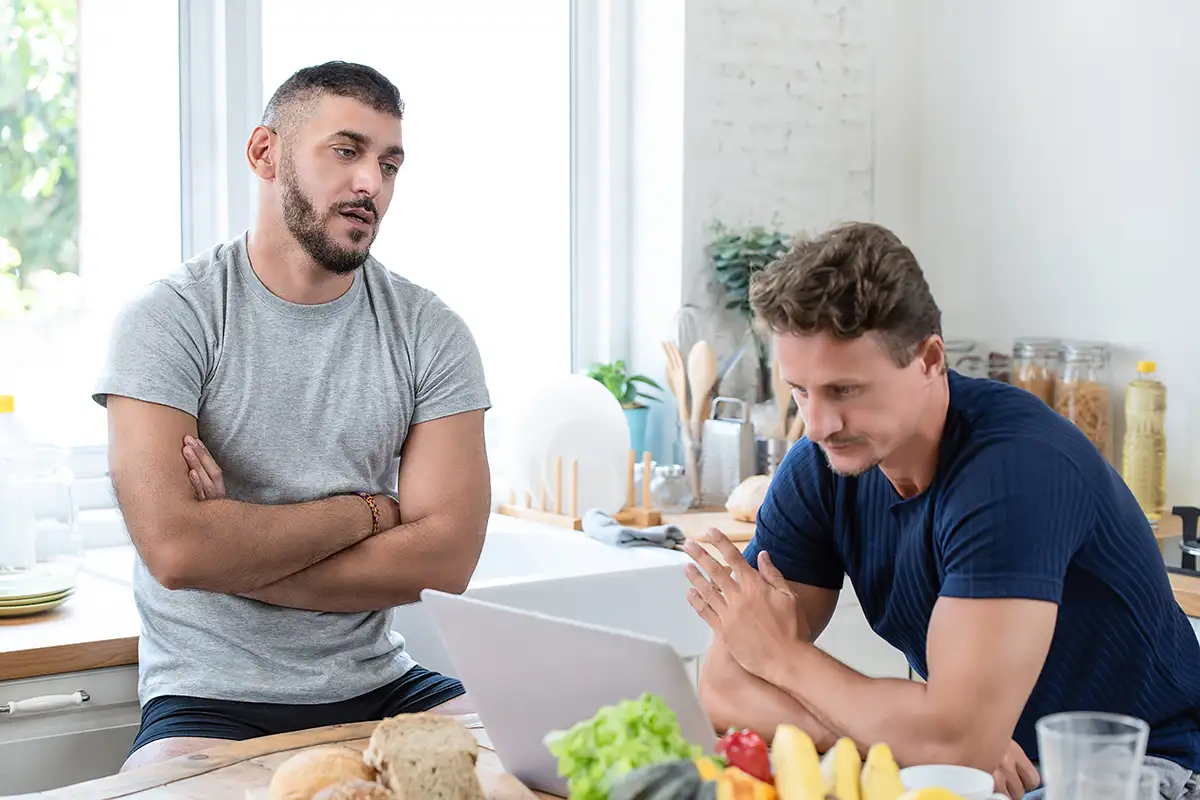
Things Change in Relationships
However we may feel when we start out in our vegan-omni relationship, the views of either party could change over time. The vegan who had secretly hoped their partner would also drop animal products from their diet may feel disappointed and let down if they don’t. The non-vegan may get sick of being made to feel bad each time they order their favorite meal in a restaurant. These kinds of fundamental issues need addressing, and it will take respectful communication and compromise to find a solution. But if the vegan just cannot countenance being with someone who eats animals, and the meat-eater simply cannot consider a life without meat, then this clash may be terminal, and an amicable parting may be best for both parties.
Children in a Vegan-Omni Household
Things can become more complicated when there are children in the household. Not only is this an added incentive to stay together, even if the ethical clashes are becoming intolerable, but there are practical measures to consider, too. What to feed children when their parents eat very differently can be an area of contention.
How it is navigated depends on many factors, including the age of the children, what their own preferences are, who does the cooking, and whether the adults are both the parents of the children in question.
In most families, the person who does the cooking tends to decide what the family eats, and when everyone eats broadly the same things, this is not too much of an issue. But in a vegan-omni relationship, there needs to be a discussion about what is the right diet for the children, and who should provide it. We know it is perfectly possible to raise happy, healthy vegan children and millions of people do so, but if the omni parent does not know this, or does not feel confident providing nutritionally sound vegan meals for their children, then there can be a problem.
The vegan parent may need to do the cooking (and some educating) for a while or create a folder of recipes that their partner can dip into. But if the omni parent objects to their children being vegan on other grounds, then a compromise must be sought, perhaps with some meals being vegan and others not.
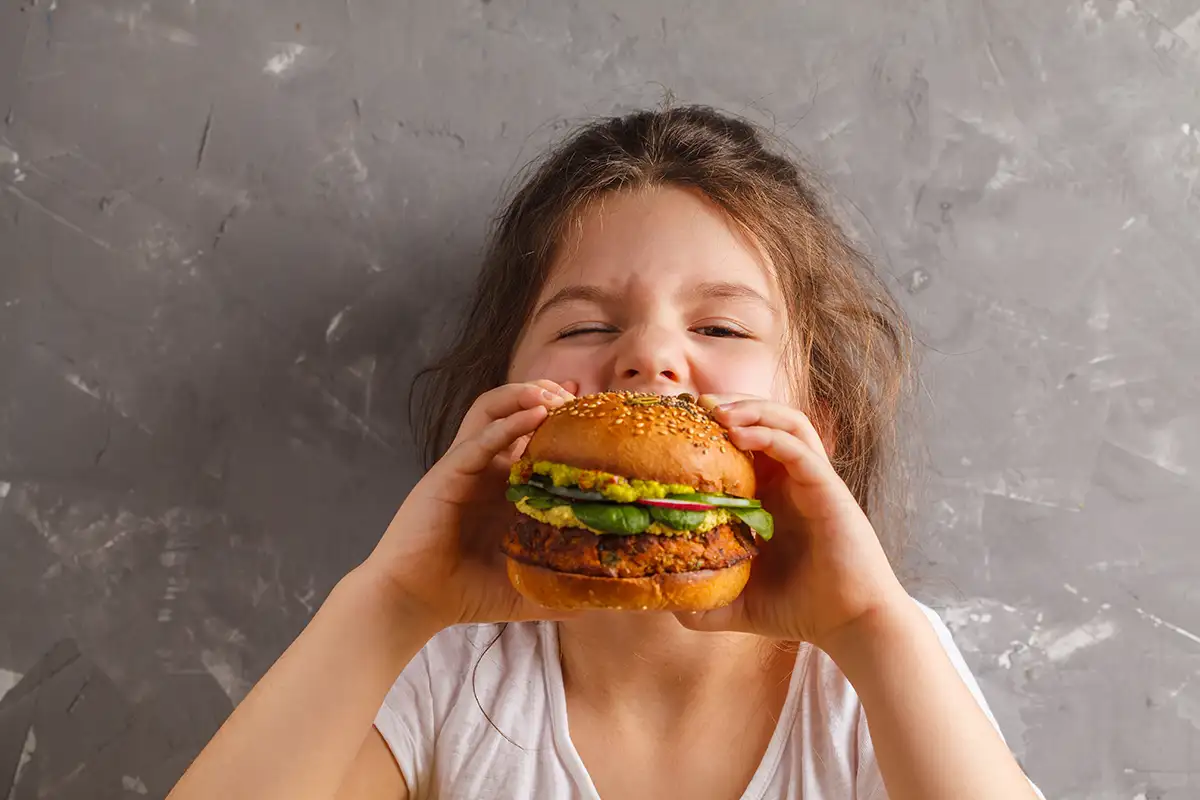
Should We Raise Our Baby Vegan?
Vegan couples usually raise their babies vegan, too. They already know the reasons for veganism, and have explored the foods, understand the nutritional requirements, and will have seen that countless other couples have already raised healthy vegan babies. They know that a plant-based diet is a great option for all stages of life, but an omnivore partner will not know all this and may have concerns about how healthy and practical a vegan diet is. If their partner has been vegan for a long time, they may know more about the issues and have fewer concerns, but if their partner is newly vegan, this can create some lively discussions and even some disagreements. As always, we suggest open and respectful dialogue to share viewpoints, listen to concerns, and to find a way forward that both parties are happy with (ideally) or, at least, can live with.
Practical Tips for a Vegan-Omni Relationship
Ethical discussions aside, there are some practical issues to consider when each partner has different food requirements. Some of the questions to answer are:
- Are you going to eat together?
- Who will do the cooking?
- What will they cook?
Vegans and Meat-Eaters Eating Together
If you decide to eat together, either every day or at regular intervals, it is best to discuss who will cook and what you will eat. If the vegan is comfortable with their omni partner cooking and eating all or some animal products, that may be a compromise. Or it may be the omni partner eats vegan foods whenever you eat together but will make their own foods on other days. Discussing your schedules and requirements together should lead to an outcome that is right for you both.
Who Will Cook in a Vegan-Omni Household?
If both partners are happy to cook, then you may take it in turns. It may be you both cook plant-based dishes, or it may be you cook dishes that are plant-based at their core, but the omni partner may add another element to their plate, such as dairy-based cheese on top of pasta. If the vegan partner does all the cooking, the omni may have to accept that all the dishes they are offered are vegan as most vegans are not at all comfortable cooking animal products. If the omni partner does all the cooking, they will need to ensure that their partner’s wishes are respected. This may include not using the same utensils to cook vegan and non-vegan dishes or allowing their partner to double-check the list of ingredients on any product used.
What To Cook in a Vegan-Omni Household
There are some dishes that have all the elements to satisfy a plant-based eater and an omni, too. These include spaghetti bolognese (using soy grounds or lentils, or both), bean burritos with vegan cheese, and curries, soups, and stews. There are also many plant-based meats so you can switch burgers and nuggets for a vegan meal that tastes identical to its meat-based counterpart. These kinds of products and dishes mean there are many options available that should please everyone.
And then there are dishes like stir-fry, pizza, or ramen that are plant-based at their core and can have a vegan or a non-vegan element added, such as vegan or dairy cheese on the pizza, or a plant-based protein like tofu or a meat-based protein added to the others.
Otherwise, there are millions of delicious plant-based recipes freely available online. Getting together to choose which of these sound tastiest — and perhaps even cooking them together — can be a fun exploration, and lead to a meal you can both really enjoy.
Some partners may choose to cook their own individual meals, and may even eat on their own, too, either sometimes or as a matter of course.
Many people choose a hybrid of these options.
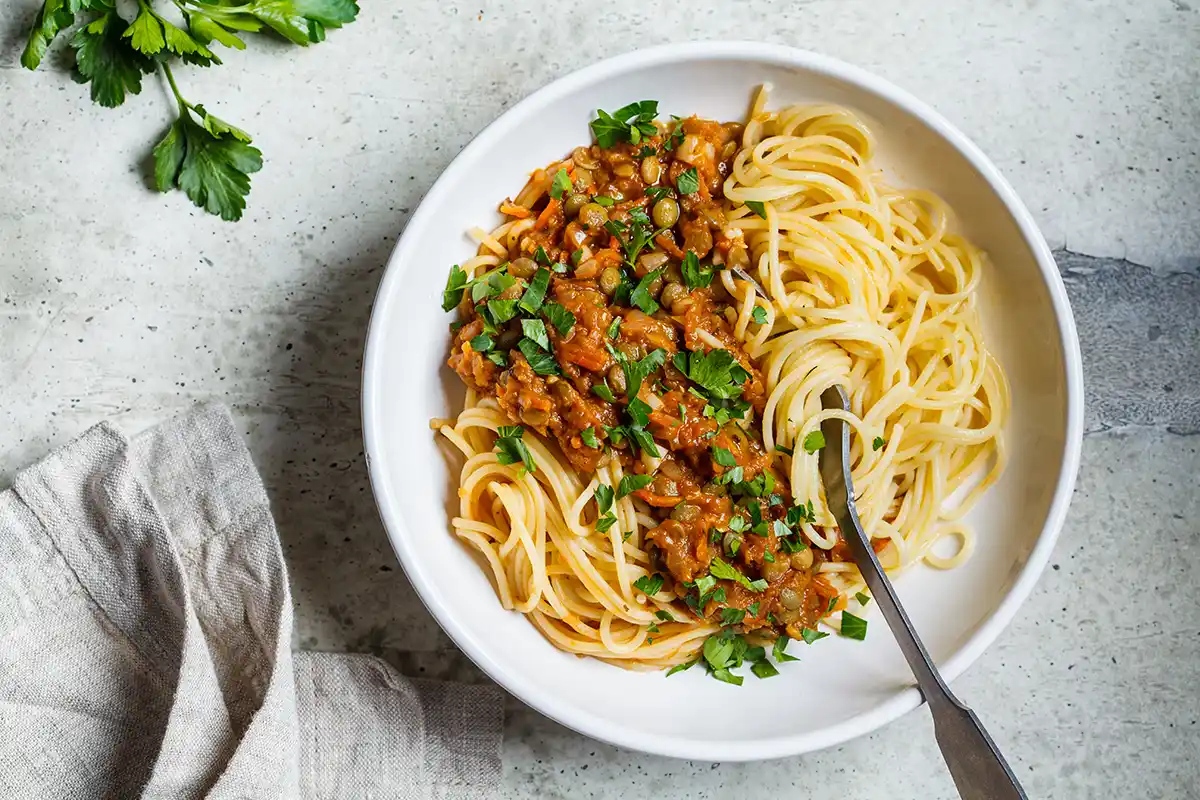
Conclusion
What we eat can have a profound effect on our connection with our partner and also create practical challenges that need to be addressed. However, if the relationship is based on love and respect, and communication is honest and kind, there are lots of ways to successfully navigate these issues through dialogue, understanding, and compromise.
